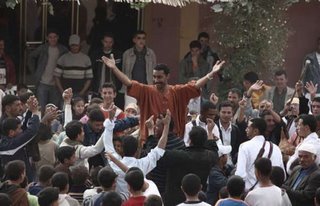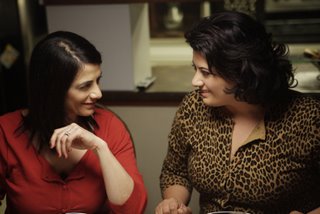
Now in its fifth year, the
Dubai International Film Festival stands at an uncertain but nonetheless exciting crossroads in the international film scene.
In the last several years, the Middle East, particularly the United Arab Emirates, has been a source of financing for both studio and independent organizations ranging from Warner Brothers to Participant to Sundance to National Geographic. As the real estate and finance bubble accelerated in recent years, Dubai, known for both, became also a synonym for outsized opulence, glitz and glamour. However, as the “office space for rent” and stalled construction projects spotted during the car ride from the airport at this year’s fest revealed, Dubai has been hit by the global downturn just like everywhere else. Perhaps appropriately, then, the 2008 Dubai International Film Festival (December 11 - 18) didn’t completely coincide with my expectations. (For the record, I traveled there as a guest of the festival.) Yes, there were incredible accommodations, stars (Salma Hayek, Goldie Hawn, Ben Affleck and, to introduce producer Charles Roven, who received the Outstanding Filmmaker of the Year Award, Nicolas Cage), and lavish events, but there were also serious discussions about the region’s role in international production made even more urgent by the global economic disruption. Commented Nadia Saah, partner in
BoomGen Studios, which provides niche marketing, publicity and strategy services for Arab films in the U.S. market, “There are more people this year, and there is a higher level of engagement. In terms of the business side, there is less celebrity flash. It is more substantive, and the industry office here is working really hard to make that possible.”
I spent most of my four days at Dubai at industry events, and, for once, the musty back-and-forth that I associate with film festival panel discussions was nowhere to be found. Instead, the very real questions involving “capacity growth” (i.e., new theaters in the Middle East, audience development, and production) and the responsibility of local investors to the region’s artists and audiences were hotly debated in panels like one titled “Who is Holding the Purse Strings?” Walt Disney Studio’s Michael Andreen stated that the region was “one film away” from a crossover hit that would bridge its film community to international audiences while Bahrain-based Sherezade Film Development’s Steffen Aumueller discussed his strategy of raising money in the region for Western films like
Smart People and
New York, I Love You by comparing for his investors the world of film financing to real estate deals. Similarly, U.S./UAE Serafina Films’s ubiquitous Susanne Bonet stressed her experience developing sound screenplays and explained how she’d apply those skills to the movies she’s intending to make in the region. But during the Q&A, one audience member jumped up to argue that “developed stories” was code for censorship as it automatically ruled out work that would challenge the region’s tastes while another bemoaned the lack of the local financiers themselves on the panel. (A behind-closed-doors session, moderated by Colin Brown, actually did introduce a number of the region’s financiers to the attending Hollywood community.) On another panel, Jordan-based Laith Al-Majali, who produced
Captain Abu Raed, which won the World Cinema Prize at the 2008 Sundance Film Festival, described the local filmmaking situation thusly: “Arab moviegoers prefer English-speaking films or commercial Egyptian film. They don’t know Arab independent films exist. Arabs can sustain a Las Vegas but cannot sustain a cinema.”

Developing an Arab cinema is a goal of the Dubai Film Connection. The Dubai Film Connection is DIFF’s CineMart-like financing market, which this year included Cherien Dabis’s
Amreeka (
pictured below) as a work-in-progress seeking finishing funds and
Filmmaker “25 New Faces” director Annemarie Jacir’s Jordan-set period drama,
When I Saw You. Says Lucas Rosant, a consultant and member of its selection committee, “The Middle East is one of the only places in the world where they are still opening theaters. The positive effect of the financial crisis here is that investors realize that cinema is crisis-proof. People need entertainment, and you can still make money. And they realize to do that they need to develop talent. This year for the first time we got sponsors from Bahrain and Kuwait who are looking for Arab content for theaters, TV and DVD. Even Disney is now investing in the production and development of films in Arabic.” Backing up his words, Rosant notes that of the 15 projects in last year’s inaugural Dubai Film Connection, seven have already been shot. “A 50% success rate? That’s great. It means something is really happening here.
Dabis commented, “This is my third year at Dubai. My first year I was here for a short film, which won an award that enabled me to continue working on the feature. I came back to the Dubai Film Connection the next year with
Amreeka and had a series of meetings. We won an award at the market, and we closed our Middle Eastern presales.” Confirms
Amreeka producer Christina Piovesan, about 10% of the film’s $2.5 million budget came from Showtime Arabia (pay TV) and Ratana Studios (free TV and theatrical) — the first time these entities got involved in international production.
Other memorable conversations: a panel on cultural exchange moderated by Cameron Bailey with filmmakers Haile Gerima and Deepa Mehta. It turned into an extended dicussion on Barack Obama and his ability to deliver global change, with an optimistic Jeffrey Wright, in Dubai with both
W. and
Cadillac Records, debating Gerima (who saw Obama as representing the end of the idea of “transformational mobility”) from the audience. Among the American indie filmmakers who attended with their films were producer Alex Orlovsky (
Momma’s Man), director Nina Paley (
Sita Sings the Blues) and actor Michael J. Smith (
Ballast). So Yong Kim’s
Treeless Mountain (
pictured at bottom) won Best Film in Dubai’s Asia/Africa Competition while Lyes Salem’s
Masquerades (
pictured at top) won top honors in the Arab Muhr Competition.
(An edited version of this report appeared in the Spring, 2009 edition of Filmmaker
.)Labels: Festivals
# posted by Scott Macaulay @ 8/08/2009 02:23:00 PM
Comments (0)


